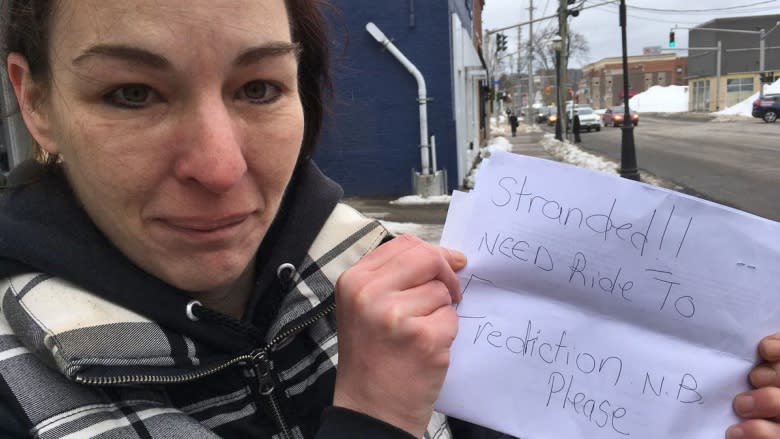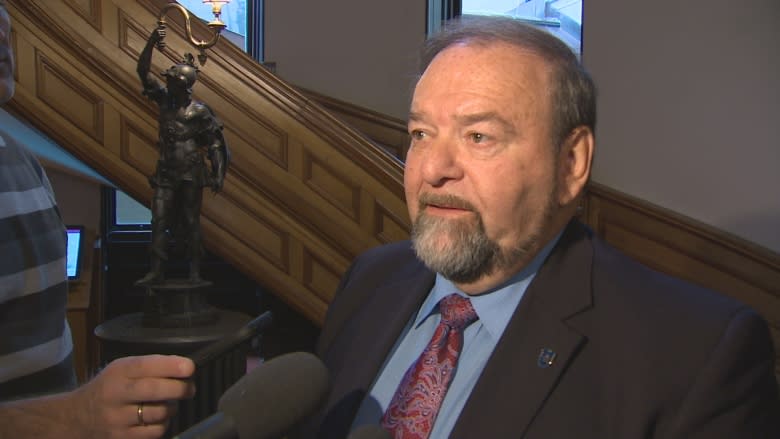Minister doesn't want anyone else stranded at night by jail staff
New Brunswick's minister of justice and public safety indicated Friday that he's following up on a Fredericton woman's complaint that she was abandoned by corrections staff at a gas station outside Miramichi on Family Day and left to find her way home at night with $18 in her pocket.
"We're going to look at what can be done so this doesn't happen in the future," Dennis Landry said in French when he was questioned in the legislature about the case of Serena Woods.
He said he could not discuss specific cases and made no other comment about Woods's account.
Fredericton woman says jail staff left her stranded at gas station on outskirts
Earlier this week, Woods told CBC News she was fined $100 for breaching a court order and $100 for not paying a victim fine surcharge but didn't have the money to pay. Fredericton police put her in a holding cell overnight.
But because police aren't allowed to hold someone more than 24 hours, she was transferred by sheriffs to the New Brunswick Women's Correctional Centre in Miramichi.
By the time she got there, however, her fines were deemed paid because of the time she had already spent in custody.
Jail staff dropped her off at a gas station, which doubles as a bus station, but the bus comes only once a day, at 9:40 a.m.
It was already after 4:30 p.m. and she wouldn't have been able to pay the $77.20 fare anyway.
Woods said she voiced her concerns about not having a way to get home to Fredericton, but the corrections staff gave her a Google Maps printout and suggested she hitchhike the estimated 200 kilometres.
Landry said Friday that transportation upon release is an offender's responsibility.
Institution staff can help individuals find a community program, community organizations or family members to help them get home, but staff don't have a world of resources, said Landry.
Woods said staff gave her the phone number for a women's shelter, but when she called she was told it was only for abused women.
Policy changes needed
New Brunswick's ombudsman contends the case illustrates the need for policy changes.
Charles Murray says staff might have been following policy, but Woods was put in a potentially dangerous situation.
"I think at the heart of it all was there was a failure as human beings to recognize the vulnerability of this woman caused by her poverty," he said.
For some people, being stranded might be an inconvenience, but they would have the means to find a way home, said Murray. Woods didn't.
"Our duty to protect her and care for her and to just treat her with respect as a human being, we just didn't discharge it," he said.
Instead, two Good Samaritan truck drivers came to Woods's rescue and got her home safely.
"So the disturbing question is, how is it that the private company and the supervisor that approved that were able to find a way to do the thing that we, as New Brunswickers, would want, but that our government, the department that we hire to reflect our values, missed it so badly?
"And that's where I think we have to have some really hard reflection on how we can do better," said Murray.
Take the extra step
The minister, premier and MLAs need to ask themselves if jail staff did the right thing in this particular situation, if they're comfortable with their conduct and whether it reflects the values of New Brunswickers, he said.
"If the answer to that is no — and I think it should be, and if I know those people it is — then it's on them now to provide direction to the department and to the employees to ensure that in cases like this, the extra step is taken" to ensure a vulnerable person is safe.
In Woods's case, a simple call to the Department of Social Development's emergency line, the Elizabeth Fry Society, or any one of the numerous charities in the community could have resolved the situation, said Murray.
He also noted that a phone call before transporting Woods from Fredericton to Miramichi could have "saved everyone a lot of trouble" if officials realized she was going to be released as soon as she got there.
Murray rejected any suggestion that Woods deserved such treatment because she had run afoul of the law.
"I'm not sure what lesson the people who are getting processed for not paying fines are supposed to learn. Are we basically prepared to tell them, 'Look, the system is going to continue to process you and you're going to spend another night in jail until you get the message — stop being poor.' Is that what we're trying to do as a society?
"I think we have to be a little more rational about this and say, 'Look if it's not realistic for this person to discharge this money, let's find some other solution."




